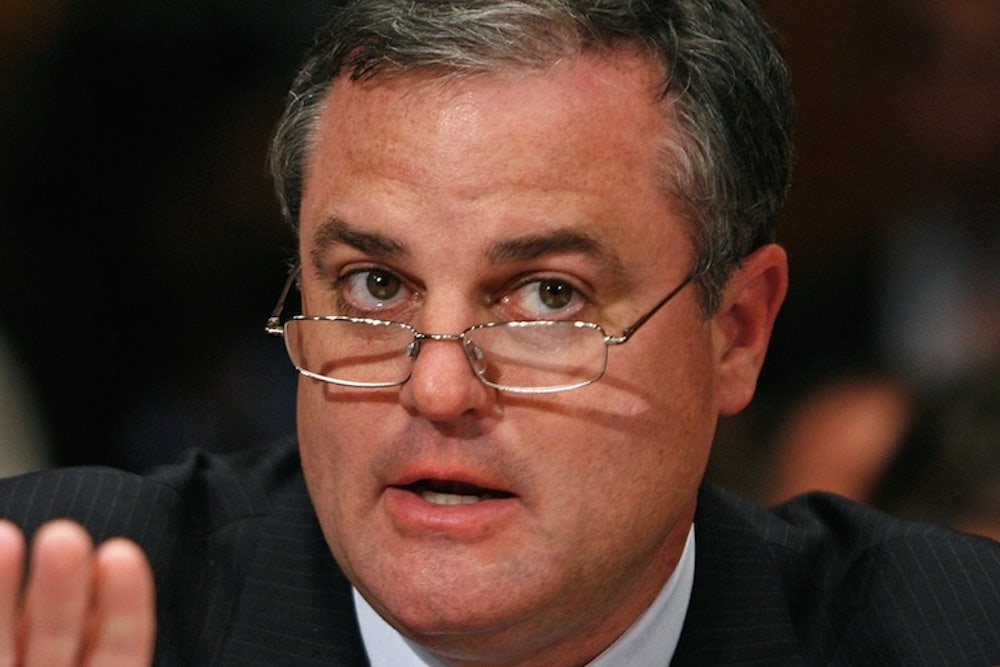Can Democrats turn Obamacare into a political advantage? Senator Mark Pryor seems to think so.
Pryor, who is fighting a tough reelection battle in Arkansas, has just released a new television ad touting his support for the Affordable Care Act. In the ad, Pryor talks about his own bout with cancer—and about his fights with insurance companies that refused payment for treatments. “No one should be fighting an insurance company while you’re fighting for your life,” Pryor says. “That’s why I helped pass a law that prevents insurance companies from canceling your policy if you get sick, or deny coverage for preexisting conditions.”
This isn’t just some ad the Pryor campaign posted online, in order to gin up donations from liberals. Greg Sargent of the Washington Post reports that it’s airing across the state, at a cost that runs into hundreds of thousands of dollars. And while one ad does not a political trend make, you don’t have to squint to see signs that the politics of Obamacare are shifting. Bloomberg News just did a study of Republican television ads and discovered that mentions of Obamacare are way down from where they were a few months ago. Meanwhile, as Sargent has pointed out several times, Republican Senators and Senate candidates are struggling to explain their opposition to the law, even in conservative states.
This doesn’t mean Obamacare has suddenly become popular. Its standing in the polls is at record lows, while Obama himself remains politically toxic across much of the South. That probably explains why Pryor’s ad conspicuously avoids mentioning the law or the president by name.
But people’s feelings about the health care law are complicated. Whatever the attitudes of American voters towards “Obamacare” per se, large majorities seem to approve of what Obamacare actually does. They like the idea of making sure anybody can get insurance, regardless of income or pre-existing conditions. They want to make sure policies are reasonably comprehensive, so that people with insurance don’t still face financial ruin. Sometimes they even like the law as a whole, as long as they don’t associate it with the president. This is perhaps most obvious in Kentucky, where “Kynect,” the state’s version of the program, consistently polls well but “Obamacare” does not.
Republicans, by proposing to take Obamacare off the books, commit themselves to taking away these benefits. That renders them vulnerable, in ways that Democrats have exploited at least once before.
I’m speaking, of course, about the 2012 presidential election. After playing down the issue during the early parts of the campaign, Obama started highlighting the law’s benefits and reminding everybody that Romney had committed himself to total repeal. Not only did that argument cast Romney as somebody who would make it harder for people to pay their medical bills, it also reinforced the public perception that Romney, and Republicans more generally, were out to take things away from the poor and middle class. I’m not sure how much those attacks ultimately helped the Democrats’ cause. But they sure didn’t hurt.
Keep in mind that this is how Democrats usually win on Medicare and Medicaid—by reminding voters of what they have to lose from proposed Republican attacks on the programs. Maybe that's how Democrats will win on Obamacare, too.
—Jonathan Cohn
News from Wednesday:
FERGUSON DEVELOPMENTS The city had its first relatively peaceful night, with only minor incidents. Attorney Eric Holder visited, met with local leaders, and promised a fair and independent investigation from the feds. In St. Louis, local prosecutor Bob McCulloch said that he began presenting evidence to a grand jury—but warned that the process could take several weeks. (St. Louis Post-Dispatch, Los Angeles Times)
ANOTHER ST. LOUIS SHOOTING St. Louis police released video of white officers shooting and killing another African-American man. The police said they did so to answer questions about the circumstances of incident and a union representative said it was “exculpatory.” Lots of people who've seen the (disturbing) video disagree. (Vox)
CLIMATE North Carolina finally passed legislation tackling coal ash, after a big spill from Duke Energy earlier this year. Environmentalists say the measure is too weak and is likely to raise customers' rates. (Andrew Kenney, News & Observer)
ECONOMY: The Federal Reserve's July minutes reveal that the Fed sees the economy continuing to improve at a steady pace. (Matt O'Brien, Washington Post)
Articles worth reading
The ice bucket challenge is great: But Jason Millman warns that it’s going to take a lot more money to fill the funding gap for researching ALS, and other diseases, because of cuts to the National Institutes of Health. (Wonkblog)
New evidence on the gender pay gap: Claire Cain Miller writes up a new study, by Harvard economist Claudia Goldin, on how a “penalty” for part-time work affects women disproportionately. (The Upshot)
Scared about global warming and not afraid to admit it: Meteorologist and writer Eric Holthaus declares he's a climate change alarmist—and that, after years of fighting off Internet trolls, it's time to reclaim the label. (Slate)
Stop and think about stop-and-frisk: Emily Badger looks at data suggesting the highly touted police tactic didn’t do much good in New York City. (Wonkblog)
Paul Ryan, same as he ever was: Remember all that talk about reform conservatism, and putting less emphasis on budget-depleting tax cuts? Ryan just made clear it’s not for him. He’s still a supply-sider. (Jonathan Chait, New York)
The weakest link: Evan Soltas takes a look at a selection of economic indicators and sees one glaring weakness: the housing market.
Stories we’ll be watching
Ferguson is still in the news. But most attention today will probably be on foreign policy—and the James Foley story.
At QED
Unemployment is making people miserable—and there’s data to prove it. Danny Vinik writes it up. Also, don’t miss Yishai Schwartz on Ferguson. It seems that Missouri law will make it nearly impossible to get a conviction of Officer Darren Wilson, no matter what the facts of the case.
